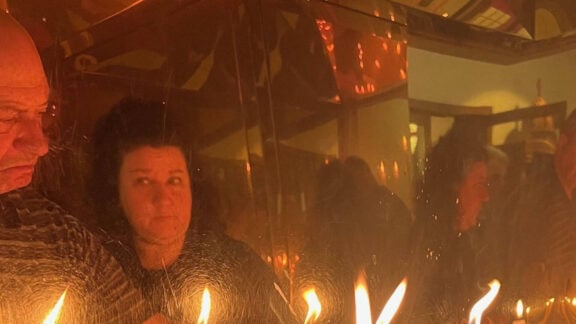Two well-known Greek American authors and journalists Nicholas Gage and Nicholas Basbanes have sued the companies behind ChatGPT.
According to Associated Press, Basbanes, 81, was the first of the duo to test out AI chatbots, finding them impressive but prone to falsehoods and lack of attribution.
He got together with Gage, 84, and the two filed their lawsuit earlier this year, seeking to represent a class of writers whose copyrighted work they allege “has been systematically pilfered by” OpenAI and its business partner Microsoft.
“It’s highway robbery,” Gage said in an interview with AP.
“It is,” added Basbanes. “We worked too hard on these tomes.”
Their lawsuit is being included into a broader case seeking class-action status led by names like John Grisham, Jodi Picoult and “Game of Thrones” novelist George R. R. Martin.
All cases claim that OpenAI, with help from Microsoft, takes human writings to “train” AI chatbots to produce human-like text without any permission or compensation.
“If they can get it for nothing, why pay for it?” Gage said. “But it’s grossly unfair and very harmful to the written word.”
The companies have been fighting the allegations in court and in public, as have other AI companies against not just writers but visual artists, music labels and other creators.

Gage and Basbanes are long-time friends who live near each other in the same Massachusetts town and have each devoted decades to reporting, writing and book authorship.
Gage, (original name Nikos Gatzoyiannis) wrote about his tragic family story in the best-selling Eleni (1983).
His mother Eleni was executed for arranging the escape of her children from their Communist-occupied village during the Greek Civil War.
The autobiographical memoir inspired the 1985 film ‘Eleni’, starring John Malkovich as Gage.
Gage quit his job at the Times and went into huge debt to find out who was responsible for his mother’s death.
“I tracked down everyone who was in the village when my mother was killed,” he said.
And they had been scattered all over Eastern Europe. So it cost a lot of money and a lot of time.
“I had no assurance that I would get that money back. But when you commit yourself to something as important as my mother’s story was, the risks are tremendous, the effort is tremendous.”
As a journalist he achieved fame investigating the mafia, was the first reporter to hear the Nixon tapes and was instrumental in exposing corruption in the past of US Vice President Spiro Agnew.
Basbanes was a daily newspaper reporter before he moved into writing widely-read books.

He had heard of and admired Gage and in the early 1970s was surprised by a telephone call asking for him using the Greek way of pronouncing his name.
“You were like a talent scout,” Basbanes said. “We established a friendship. I mean, I’ve known him longer than I know my wife, and we’ve been married 49 years.”
He said it can sometimes take days to craft a great paragraph and confirm all of the facts in it.
His 1995 book “A Gentle Madness”, about the art of book collection, took years of research and travel to archives and auction houses.
“I love that ‘A Gentle Madness’ is in 1,400 libraries or so.”
“This is what a writer strives for — to be read. But you also write to earn, to put food on the table, to support your family, to make a living. And as long as that’s your intellectual property, you deserve to be compensated fairly for your efforts.”
Gage added that AI is catastrophic for the writing industry.
“Publications are going to die. Newspapers are going to die. Young people with talent are not going to go into writing,” he said.
“I’m 84 years old. I don’t know if this is going to be settled while I’m still around. But it’s important that a solution be found.”








